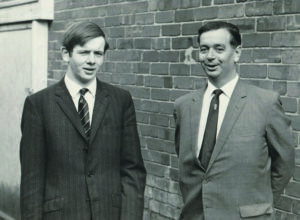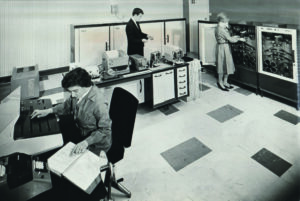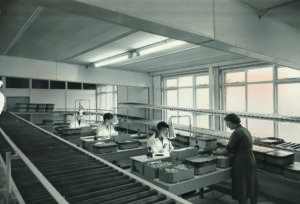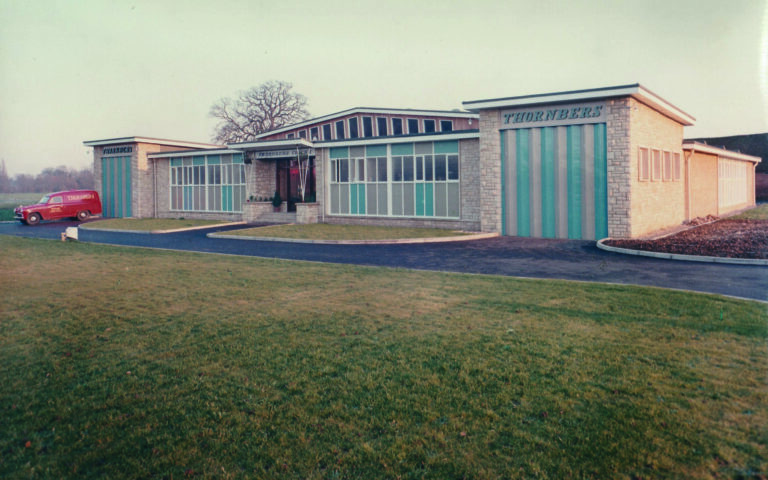Thornber Bros might have stopped trading half a century ago, but its achievements laid the groundwork for the modern industry. Michael Barker reports
Over a century ago in the little-known West Yorkshire village of Mytholmroyd, a weaver’s strike set in motion a series of events that would have a lasting impact on the modern poultry industry.
One of those weavers, 19-year-old Edgar Thornber, took the strike as a sign that it wasn’t the profession for him, and instead turned to his hobby – chickens. Initially placing a few egg boxes in his back yard and hatching chicks, he and his brother quickly put together a flock of 300 hens, investing every penny into building a business. From there, in 1907, Thornber Bros Ltd was born, and would go on to become one of the most renowned global names in hatching in its heyday of the 1960s.

Poultry Business heard the story from Edgar’s grandson Ralph Thornber, now 75, who recounted the rise, glory and ultimate fall of the Thornber Bros empire, and the influence its groundbreaking work still has on the British poultry sector.
Early days
Following its humble beginnings, the business grew as Edgar expanded his circle of customers on the back of a meticulous focus on selecting birds with the best traits. As one of the early adopters of artificial incubators – the first being housed in Edgar’s bedroom – he combined an eye for bird quality with production efficiency, and when the family moved to nearby Newhouse Farm in 2011, it was the opportunity to create a more professional setup.
Edgar continued to experiment with both pure and cross-bred stock, and soon expanded the business beyond its original remit thanks to his friendship with a local sheet metal manufacturer called Ben Stansfield. “Ben had what we used to call the tin shop, and he used to make poultry equipment,” Ralph explains. “They were doing that much work with each other that my grandad said come into the business and he became a partner with my grandad and my uncle.”
Thornber Bros went from strength to strength, and it accelerated to a new level again once Edgar’s son and Ralph’s father Cyril joined the business in 1937. When Edgar died in 1944, he left his 23-year-old son to take over a company that had achieved a turnover of £200,000 and built a real reputation in the region, but it was global recognition that now awaited the burgeoning firm.
Cyril had a true passion for breeding, and was constantly tinkering and looking for the next best chicken – a fact that gained attention from clients all over the world. “My dad didn’t give them names – they were numbers, from 101 to 909,” Ralph recalls. “We hit on a good chicken, the 404. I think we sold something like 250 million of those, and in the 1960s around 60% of eggs eaten in Japan were from our chicks.”
The business broke ground in a variety of ways. Growing to 1,400 staff and sending up to 2,000 consignments of day-old-chicks per day at its peak, it became the biggest business of its type in Europe, hiring PhDs, professors and geneticists to keep it at the cutting edge. “We employed most of our village,” Ralph observes with more than a hint of pride.

It was a fast-paced, busy business at that time. “There was something like 200 agricultural shows a year throughout the UK and we did them all,” Ralph says. “We had two trucks doing nothing else. Then we started making feeders and drinkers, and we were building hatcheries – we could build one from start to finish in 12 weeks.”
The Thornbers pioneered putting hens into battery cages (Ralph jokes that now it’s all about taking them out again), and people came from far and wide to West Yorkshire to visit the company and learn its techniques. That led to them picking up business from the most unusual places, and some singular jobs. “We built a village in Romania, put all the buildings up, wired it, put roads in,” Ralph recalls. “We were putting up poultry buildings to produce eggs all over the world.”
The modern industry would appreciate how the Thornbers led the way in trialling new technology. “We bought an Elliott 803 computer and there’s pictures of my dad signing a cheque for £64,000 for it in 1961,” Ralph recalls. “The first week it said we had no stock and sent chickens to the wrong end of the country! Everybody thought my dad was crackers, but it took so much of the office work out of the job once they got it established.” Today, that same computer is on display at The National Museum of Computing at Bletchley Park, the famous home of the World War II codebreakers.

But it wasn’t just about buying in other people’s technology – Cyril himself was innovating in a way that would leave a lasting impact on the industry for decades to come. “My father came up with blood testing and typing,” says Ralph. “Nobody else was doing it, and then everybody copied us. We also had a veterinary research laboratory in the village, which as far as we were aware was the first of its type east of the Atlantic. They were researching all sorts, production techniques, lighting programmes, everything.
Industry connections
A people person, Cyril developed strong friendships with some of the biggest players in the game. Ralph recounts how his father became friends will a man called Henry Wallace, who founded the Hy-Line poultry business that is still going strong today, while he had such a good relationship with Bernard Matthews that Cyril would pass turkey enquiries from around the world on to Matthews and he would reciprocate for chicken.

Canadian poultry pioneer Donald McQueen Shaver once came to visit Cyril and the two men spent two days locked in the office chatting. “They should have met 30 years before – they were both just chicken men and breeders and that’s what they loved,” Ralph says. “Don Shaver was the biggest opposition we had, but all of them came here.”
The anecdotes go on and on. A Japanese company used to send its people over to be trained in the Thornbers’ hatchery, while another young 18-year-old came and stayed at the Thornbers house, and later went on to become Ghana’s minister for agriculture.
Ralph tells the story of how the nearby Old Bridge Inn became famous as far afield as Japan and the US because of all the chicken industry luminaries who dined there and delighted in its centuries-old heritage when they visited the Thornbers. Cyril was open and welcoming, and perhaps that contributed in some way to his downfall, but it is also a mark of the extraordinary affection and respect which the business garnered from the industry: “This hatchery got burned down one time, it was arson,” Ralph recalls. “But the amount of opposition that rang up and said ‘if you need anything doing, we’ll do it’ was amazing. That’s how dad was – he didn’t keep his information to himself. Maybe he should have done, I don’t know.”

A sign of his desire to be open with staff and customers, Cyril produced a monthly newsletter called Thornber’s News Roundup to keep everyone informed about what the business was up to, and he was also a regular on TV and radio talking about the poultry industry.
Leaving a legacy
The golden era ended quickly when competitors started to get ahead in the 1970s. “In 1972 the job got grim, it was winding down and there were better chickens out there,” Ralph says. “It finished in 1972/73 when we sold out to a company in London called Pentos Holdings. They were just asset strippers – the guy turned up in his full-length black leather jacket, like the mafia, but that’s life. We sold out to him, but we kept most of the agricultural farms and my dad carried on breeding chickens.”
Cyril passed away in 1991, after which the family decided to give up poultry altogether, Ralph instead focusing on coverting the empty property into offices and industrial units.
As for Ralph, he never had a huge personal drive towards the poultry industry – he admits he went into the business because he “didn’t want to disappoint the family by not getting involved” – and he was happier working on the transport and logistics side of things. He isn’t in touch with the industry any more, but does still attend the odd get together which serves as a reminder of the enormous legacy that three generations of his family have left behind.
“It’s a source of pride that people still talk about Thornber Bros,” he says. “My dad had a load of reps that ran Lancashire and every year we had a meal there at one of the pubs. Three years ago they met up. How many companies have their reps going to something like that when the business has been closed 50 years?”
And amid all the technological advancements and innovative thinking, and the impact the Thornbers had around the world, perhaps the greatest impact of all was on the many lives they touched on their extraordinary journey.


